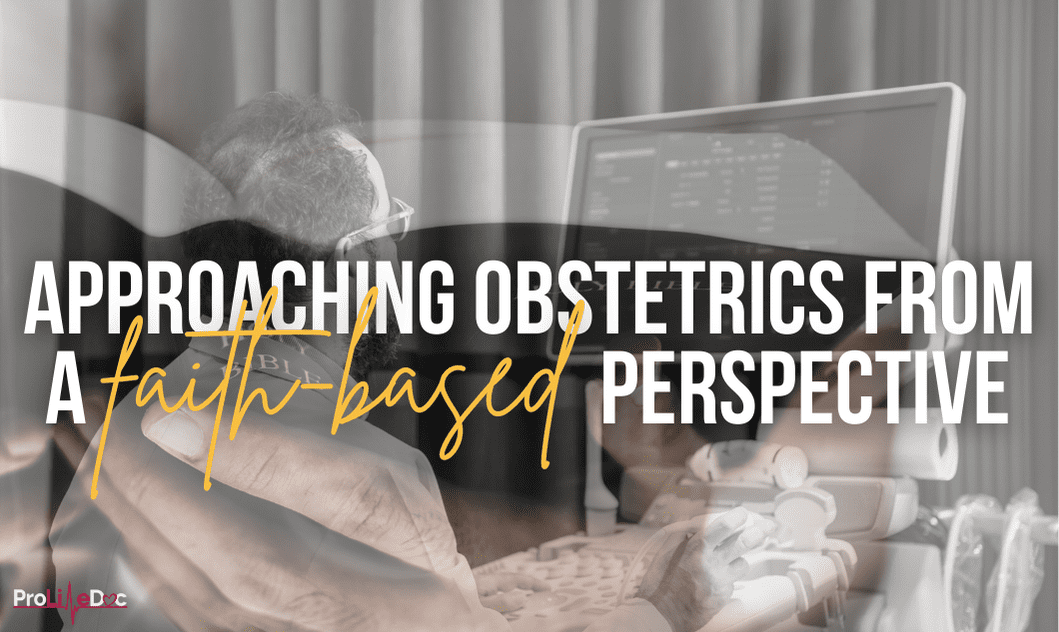As a board-certified obstetrician, my journey in medicine has been deeply intertwined with my faith. Believing that human life is a sacred gift from God has shaped my convictions and how I approach patient care. My unwavering belief in the value of every human life drives me to ensure that both the mother and her preborn baby receive the utmost respect and care in every aspect of my practice. When a pregnant woman walks into my clinic, I have two patients, not one.
My faith-based perspective in obstetrics is not about imposing my beliefs on my patients. Instead, it guides me in providing compassionate and comprehensive care for both the mother and the preborn child. My duty is to support my patients through their pregnancy journey while adhering to my ethical commitment to protect and promote life.
Pro-Life is Pro-Science
Throughout my medical career, I have encountered diverse perspectives on reproductive choices; it goes with the territory. I firmly believe in the sanctity of life, but I approach every conversation with empathy and understanding. But empathy does not allow me to hide the truth.
From a medical standpoint, life begins at conception. To those who want to argue otherwise: When else can it begin? Is it a life on the first day of the second trimester but not the day before? Is it the hour human-made technological devices can detect a heartbeat but not the hour before? Is it the week a baby has a greater than 50% chance of being able to survive outside the womb, but not the week before? Is it only when the baby is born or when a doctor successfully performs a Cesarean section before labor has commenced naturally? Does life begin at the same point of gestation for every single baby?
To entertain these questions as legitimate inquiries into the fundamental question of “When does life begin?” illustrates the absurdity of the argument that life begins at a different point than the moment of conception. In truth, these arguments do not address the question, “When does life begin?” Instead, they answer a different question: When does a particular person believe it is okay to take a baby’s life? For me, the answer is: Never.
I am confident that my faith is entirely consistent with my medical obligations toward my patients, regardless of the laws. I am upfront about my opposition to abortion and will not perform one. Patients come to me with a clear understanding of my convictions. This is reassuring to them: they are confident that I will always treat their unborn baby as a life that is just as valuable as theirs.
First, Do No Harm
The oath I took as a medical student, Primum non nocere, or “First, do no harm,” is my ethical compass. This principle compels me to safeguard the well-being of the mother and her preborn baby, both of whom are my patients. Can an obstetrician ethically ignore the health of the baby when treating a pregnant patient? Of course not. In my view, abortion violates my Hippocratic oath, as it involves ending the life of one of my patients. Full stop.
Respecting life does not mean ignoring the complexities surrounding pregnancy and childbirth, whether those complexities are social, emotional, or physical. On the contrary, it is vital to acknowledge the physical, emotional, and psychological aspects of each patient’s experience. My faith encourages compassion, which is reflected in my approach to obstetrics care. Every woman I encounter deserves to be treated with kindness and consideration. But so do their preborn babies: a mother’s life does not automatically trump her baby’s.
Understanding the miracle of life, I strive to ensure the health and safety of both mother and child. Prenatal care is a critical aspect of my practice. I want mothers to be well-informed about the development of their preborn babies and the changes their bodies are experiencing.
Regular check-ups, monitoring fetal development, and addressing potential complications are essential in promoting a healthy pregnancy. I stay current on every medical advancement that can help mothers and their preborn babies overcome health challenges during pregnancy. Today, many innovative and remarkable advances in medical science allow us to treat and even cure medical issues in preborn babies and help mothers overcome problems during pregnancy.
Being pro-life is not synonymous with being judgmental or dismissive of the challenges that some mothers face. Instead, it calls for a genuine concern for their well-being and a commitment to walk alongside them in their journey. But it also demands that they not be lied to or demeaned by shielding them from the truth of what abortion is and how abortion can affect them.
That is why I have built the ProLife Doc ministry. My mission is to promote life, health, and well-being while adhering to my oath to “First, do no harm.” It is to let women know that their God-given ability to conceive and nurture new life is a precious gift that should be valued, not degraded. My faith and profession intersect in a harmony that guides my actions and shapes my interactions with every patient I encounter.
For more information about the ProLife Doc ministry, to subscribe to my newsletter, or to donate, contact ProLife Doc today.


